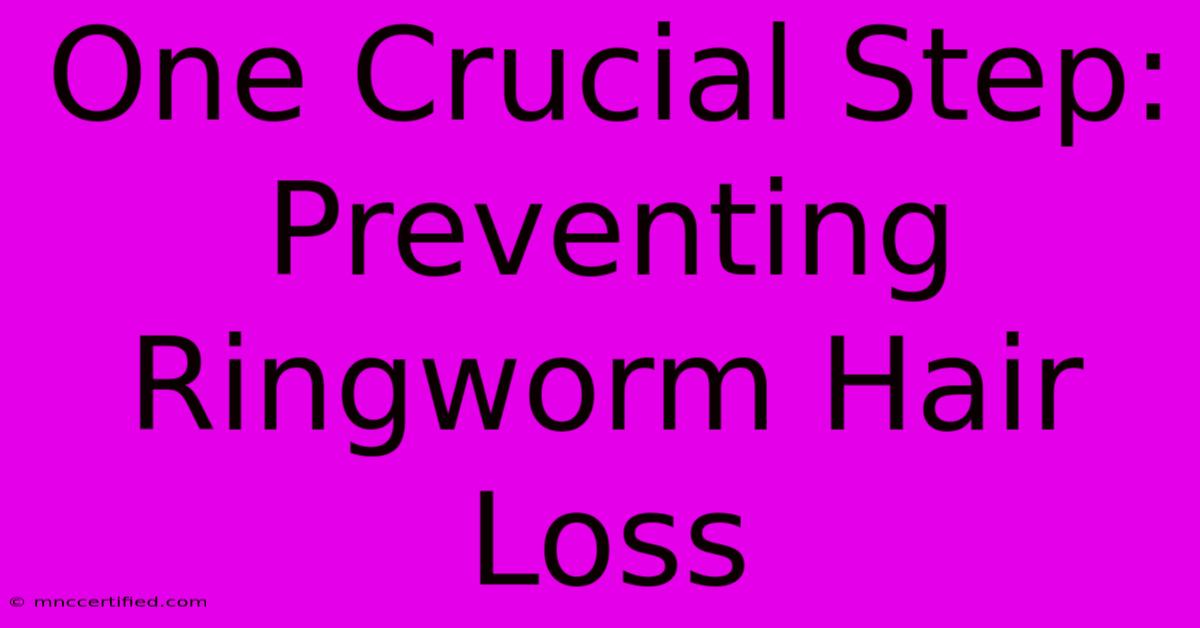One Crucial Step: Preventing Ringworm Hair Loss

Table of Contents
One Crucial Step: Preventing Ringworm Hair Loss
Ringworm, despite its name, isn't caused by a worm but a fungus. While it can affect various parts of the body, scalp ringworm (tinea capitis) is particularly concerning because it can lead to significant hair loss. Understanding this fungal infection and taking proactive steps is crucial for preventing this distressing complication. This article focuses on that one crucial step: early diagnosis and treatment.
Understanding Ringworm and its Impact on Hair
Ringworm manifests as itchy, scaly patches on the scalp. These patches can be red, inflamed, and sometimes pus-filled. In severe cases, the infection can spread, causing significant hair loss in affected areas. This hair loss isn't permanent in most cases, but the condition needs prompt attention to minimize damage and prevent lasting scarring. Key symptoms to watch for include:
- Circular, scaly patches: These are often the first sign of scalp ringworm.
- Itching: Intense itching is a common complaint.
- Hair breakage or loss: Hair within the infected area may break easily or fall out completely.
- Inflammation and redness: The affected area will typically be red and inflamed.
- Pus-filled bumps: In some cases, small, pus-filled bumps may develop.
Why Early Diagnosis is Vital for Preventing Hair Loss
The sooner ringworm is diagnosed and treated, the lower the risk of permanent hair loss. Delaying treatment allows the fungus to spread and cause more extensive damage to hair follicles. The inflammation associated with ringworm can also damage the follicles, leading to scarring and eventual permanent hair loss. Early intervention minimizes this risk significantly.
The Crucial Step: Prompt Medical Attention
This brings us to the crucial step for preventing ringworm hair loss: seek professional medical attention immediately if you suspect a ringworm infection. Don't attempt self-diagnosis or treatment. A dermatologist or doctor can accurately diagnose the condition through a physical examination and potentially a fungal culture. They will then prescribe the appropriate antifungal medication, which may include:
- Oral antifungal medications: These are often necessary for scalp ringworm, especially in severe cases.
- Topical antifungal creams or lotions: These may be used in addition to or in place of oral medications, depending on the severity of the infection.
- Antifungal shampoos: These can help to control the spread of the fungus and reduce symptoms.
Beyond Medication: Supporting Hair Health
While antifungal treatment is paramount, supporting your overall hair health can also help in recovery and prevent future issues. This includes:
- Gentle hair care: Avoid harsh shampoos and conditioners that can irritate the scalp.
- Healthy diet: A balanced diet rich in vitamins and minerals is essential for healthy hair growth.
- Stress management: Stress can exacerbate skin conditions, so managing stress levels is important.
Preventing Ringworm in the First Place
Prevention is always better than cure. Here are some proactive measures you can take to reduce your risk of developing ringworm:
- Maintain good hygiene: Keep your hair and scalp clean.
- Avoid sharing personal items: This includes combs, brushes, hats, and towels.
- Treat any existing skin conditions promptly: Addressing skin issues quickly can prevent them from becoming infected.
- Boost your immunity: A strong immune system is better equipped to fight off fungal infections.
Conclusion: Act Fast for Healthy Hair
Ringworm can be a challenging condition, but prompt action can significantly reduce the risk of permanent hair loss. The crucial step is recognizing the symptoms and seeking professional medical help immediately. Early diagnosis and appropriate treatment are key to protecting your hair and overall health. Remember, preventing ringworm through good hygiene and proactive measures is also essential for long-term hair health. Don't hesitate; act fast to preserve your luscious locks!

Thank you for visiting our website wich cover about One Crucial Step: Preventing Ringworm Hair Loss. We hope the information provided has been useful to you. Feel free to contact us if you have any questions or need further assistance. See you next time and dont miss to bookmark.
Featured Posts
-
Ex East Enders Star In New Soap
Nov 23, 2024
-
Do Guinea Pigs Bond With Humans
Nov 23, 2024
-
7 Letter Words Starting With Ro
Nov 23, 2024
-
Watch Bayern Vs Augsburg Live Stream And Time
Nov 23, 2024
-
20 Centimes Coin Value In India
Nov 23, 2024